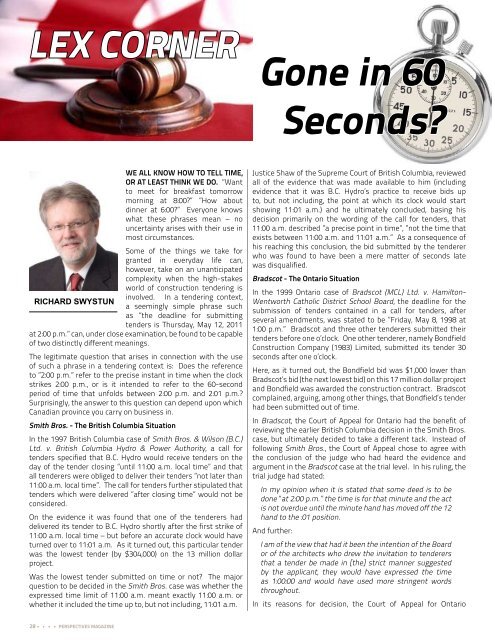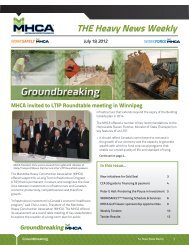2012 Perspectives Magazine - Manitoba Heavy Construction ...
2012 Perspectives Magazine - Manitoba Heavy Construction ...
2012 Perspectives Magazine - Manitoba Heavy Construction ...
Create successful ePaper yourself
Turn your PDF publications into a flip-book with our unique Google optimized e-Paper software.
LEX CORNER<br />
Gone in 60<br />
Seconds?<br />
We all know how to tell time,<br />
or at least think we do. ”Want<br />
to meet for breakfast tomorrow<br />
morning at 8:00?” ”How about<br />
dinner at 6:00?” Everyone knows<br />
what these phrases mean – no<br />
uncertainty arises with their use in<br />
most circumstances.<br />
Some of the things we take for<br />
granted in everyday life can,<br />
however, take on an unanticipated<br />
complexity when the high-stakes<br />
world of construction tendering is<br />
involved. In a tendering context,<br />
richard swystun<br />
a seemingly simple phrase such<br />
as ”the deadline for submitting<br />
tenders is Thursday, May 12, 2011<br />
at 2:00 p.m.” can, under close examination, be found to be capable<br />
of two distinctly different meanings.<br />
The legitimate question that arises in connection with the use<br />
of such a phrase in a tendering context is: Does the reference<br />
to ”2:00 p.m.” refer to the precise instant in time when the clock<br />
strikes 2:00 p.m., or is it intended to refer to the 60-second<br />
period of time that unfolds between 2:00 p.m. and 2:01 p.m.?<br />
Surprisingly, the answer to this question can depend upon which<br />
Canadian province you carry on business in.<br />
Smith Bros. - The British Columbia Situation<br />
In the 1997 British Columbia case of Smith Bros. & Wilson (B.C.)<br />
Ltd. v. British Columbia Hydro & Power Authority, a call for<br />
tenders specified that B.C. Hydro would receive tenders on the<br />
day of the tender closing ”until 11:00 a.m. local time” and that<br />
all tenderers were obliged to deliver their tenders ”not later than<br />
11:00 a.m. local time”. The call for tenders further stipulated that<br />
tenders which were delivered ”after closing time” would not be<br />
considered.<br />
On the evidence it was found that one of the tenderers had<br />
delivered its tender to B.C. Hydro shortly after the first strike of<br />
11:00 a.m. local time – but before an accurate clock would have<br />
turned over to 11:01 a.m. As it turned out, this particular tender<br />
was the lowest tender (by $304,000) on the 13 million dollar<br />
project.<br />
Was the lowest tender submitted on time or not? The major<br />
question to be decided in the Smith Bros. case was whether the<br />
expressed time limit of 11:00 a.m. meant exactly 11:00 a.m. or<br />
whether it included the time up to, but not including, 11:01 a.m.<br />
Justice Shaw of the Supreme Court of British Columbia, reviewed<br />
all of the evidence that was made available to him (including<br />
evidence that it was B.C. Hydro’s practice to receive bids up<br />
to, but not including, the point at which its clock would start<br />
showing 11:01 a.m.) and he ultimately concluded, basing his<br />
decision primarily on the wording of the call for tenders, that<br />
11:00 a.m. described ”a precise point in time”, ”not the time that<br />
exists between 11:00 a.m. and 11:01 a.m.” As a consequence of<br />
his reaching this conclusion, the bid submitted by the tenderer<br />
who was found to have been a mere matter of seconds late<br />
was disqualified.<br />
Bradscot - The Ontario Situation<br />
In the 1999 Ontario case of Bradscot (MCL) Ltd. v. Hamilton-<br />
Wentworth Catholic District School Board, the deadline for the<br />
submission of tenders contained in a call for tenders, after<br />
several amendments, was stated to be ”Friday, May 8, 1998 at<br />
1:00 p.m.” Bradscot and three other tenderers submitted their<br />
tenders before one o’clock. One other tenderer, namely Bondfield<br />
<strong>Construction</strong> Company (1983) Limited, submitted its tender 30<br />
seconds after one o’clock.<br />
Here, as it turned out, the Bondfield bid was $1,000 lower than<br />
Bradscot’s bid (the next lowest bid) on this 17 million dollar project<br />
and Bondfield was awarded the construction contract. Bradscot<br />
complained, arguing, among other things, that Bondfield’s tender<br />
had been submitted out of time.<br />
In Bradscot, the Court of Appeal for Ontario had the benefit of<br />
reviewing the earlier British Columbia decision in the Smith Bros.<br />
case, but ultimately decided to take a different tack. Instead of<br />
following Smith Bros., the Court of Appeal chose to agree with<br />
the conclusion of the judge who had heard the evidence and<br />
argument in the Bradscot case at the trial level. In his ruling, the<br />
trial judge had stated:<br />
In my opinion when it is stated that some deed is to be<br />
done ”at 2:00 p.m.” the time is for that minute and the act<br />
is not overdue until the minute hand has moved off the 12<br />
hand to the :01 position.<br />
And further:<br />
I am of the view that had it been the intention of the Board<br />
or of the architects who drew the invitation to tenderers<br />
that a tender be made in [the] strict manner suggested<br />
by the applicant, they would have expressed the time<br />
as 1:00:00 and would have used more stringent words<br />
throughout.<br />
In its reasons for decision, the Court of Appeal for Ontario<br />
28 perspectives <strong>Magazine</strong>

















